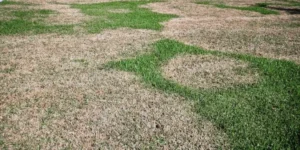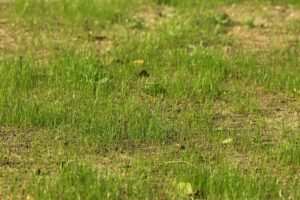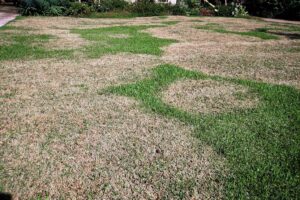As spring arrives in York County, SC, homeowners in Rock Hill, Fort Mill, Clover, Tega Cay, and Lake Wylie are eager to see their Bermuda lawn flourish. The transition from dormancy to active growth is a crucial time for lawn care, and the steps you take now will determine whether your lawn thrives throughout the season.
At Hippo Turf Care, we’re committed to providing expert guidance to help you achieve the lushest, healthiest lawn on the block. While we handle the agronomy side, your involvement is essential in maintaining and maximizing Bermuda lawn growth. Here’s how you can ensure success this spring.
1. Establish a Consistent Mowing Routine
Regular mowing is one of the most important aspects of Bermuda lawn maintenance. Unlike cool-season grasses, Bermuda requires frequent mowing to maintain its dense, carpet-like appearance. Here’s what you need to know:
- Mow Weekly or Bi-Weekly: Once Bermuda grass starts growing actively, mowing once or twice a week is essential. More frequent mowing encourages lateral growth, resulting in a thicker, healthier lawn.
- Mow at the Right Height: The biggest mistake homeowners make is cutting too low too soon. If you mow and notice your lawn turning from green to brown, you’re scalping the grass. This stresses the plant, forcing it to use stored carbohydrates to recover instead of growing vigorously.
- Rule of Thumb: If you want to mow lower, mow more often. If you can’t commit to mowing two or three times per week, keep the mower height slightly higher. Finding the balance ensures that your Bermuda grass remains strong and resilient.
2. Watering the Right Way

Watering is another key factor in achieving a thriving Bermuda lawn. Many homeowners either overwater or underwater their grass, leading to weak root systems or dry patches. Here’s how to get it right:
- Aim for 1 Inch of Water Per Week: Bermuda grass needs about an inch of water per week to stay healthy. However, this doesn’t mean watering a little every day.
- Deep and Infrequent Watering: Instead of daily watering for a few minutes, focus on deep watering sessions two to three times per week. This encourages deep root growth, making the grass more drought-resistant.
- The Screwdriver Test: An easy way to check soil moisture is by inserting a screwdriver into the ground. If it goes in at least four inches without resistance but doesn’t create a muddy mess, you’re on the right track.
- Use a Rain Gauge: To determine how long it takes your irrigation system or sprinkler to put out one inch of water, place a few rain gauges around the lawn. Divide the total time required by three to know how long to water during each session.
3. Spring Lawn Preparation
As Bermuda grass wakes up from dormancy, preparing your lawn properly will set the stage for strong, healthy growth.
- Remove Thatch and Debris: If your Bermuda lawn has accumulated dead grass and debris over the winter, use a dethatching rake or power rake to clear it out. This allows sunlight, water, and nutrients to reach the soil more effectively.
- Aerate the Soil: Core aeration in early spring can improve air and water penetration, preventing compaction and promoting deeper root development. If your lawn feels hard underfoot, aeration is a must.
- Fertilize Wisely: Once Bermuda grass begins active growth (typically when soil temperatures reach 65°F), apply a balanced fertilizer to provide essential nutrients. Avoid fertilizing too early, as this can encourage weed growth rather than strengthening the grass.
4. Managing Weeds and Pests
A thick, well-maintained Bermuda lawn naturally crowds out weeds, but early intervention is still important.
- Pre-Emergent Weed Control: Applying a pre-emergent herbicide in early spring helps prevent common weeds like crabgrass and spurge from taking over your lawn.
- Spot Treat Weeds: If weeds do appear, use a selective herbicide that targets broadleaf weeds without harming Bermuda grass.
- Monitor for Pests: Armyworms, grubs, and mole crickets can damage Bermuda lawns if left unchecked. Keep an eye out for signs of insect activity, such as brown patches or increased bird activity on your lawn.
5. The Power of Patience and Consistency
Bermuda lawns are a great option for York County homeowners; the effort you put into your lawn during spring will pay off in the months ahead. By mowing correctly, watering efficiently, and following best practices for fertilization and weed control, your lawn will be the envy of the neighborhood.
At Hippo Turf Care, we understand that lawn care can sometimes feel overwhelming. That’s why we’re here to guide you every step of the way. If you have questions or need professional turf management services in York County—including Rock Hill, Fort Mill, Clover, York, Tega Cay, and Lake Wylie—reach out to us. Let’s work together to make your Bermuda grass thrive this season!

Your dream lawn is within reach—start now and enjoy a beautiful, green Bermuda lawn all season long! Call Hippo Turf Care at 803-810-1145.







